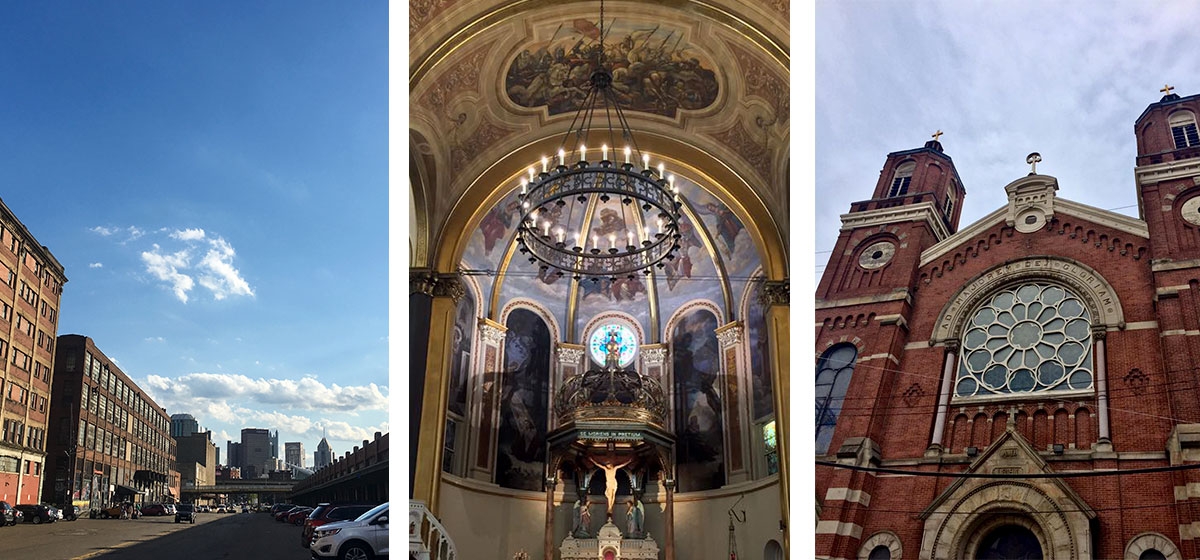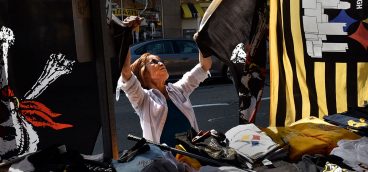Everything Must Change

Everything must change. Nothing stays the same, and there aren’t too many things you can be sure of. At least that’s what George Benson says. It’s a heartbreaker of a song, but I think he’s right.
For Mother’s Day, my family took me to the Strip District, It’s one of my favorites with markets and stores from around the world: Italian, Greek, Mexican, Korean…you name it. I buy my veggies at one place, cheese at another, sausage at another. It’s what shopping for groceries and wares must have been like 100 years ago. Until recently, it hasn’t changed much.
My husband’s grandmother was baptized here 100 years ago, at St. Stanislaus, a Polish-Cathedral style church in the heart of the Strip, and one of the city’s oldest churches. My husband’s grandmother is gone now, but the church is still here.
Some Sundays, my mother and her husband take our kids to mass there. I think how incredible it is that my children can stand where their great-grandmother stood and look through the same stained-glass windows. The glass reminds me of a kaleidoscope, constantly changing as the sun rises and sets.
I think of my husband’s grandmother, once a baby in her baptismal gown, spotless, her parents holding her up as beams of colored light danced and shown upon her. I think of her smiling. I think of how gentle and loving and kind she was and how she spoke in a bygone way.
“That’s too much for you, darlin,’ ” she would say. “You need to rest a while, dearheart.”
I think of her knitting mittens and scarves for my daughter, using bright-colored yarn because those were the only colors she could see. I think of her as her world dimmed, losing sight completely. I think of the end of her life, dying alone in a nursing home. I think of the strangeness and sadness of it all.
“The young become the old,” George Benson says.
My grandfather became old and senile.
My mother would lay out boxes of old pictures for him to pull down cobwebs in the tangled parts of his mind. She gave him a pencil to write down the names of the people in the photographs:
“This is my sister, Anna. She died at age one.”
“This is my cousin from Italy.”
“This is my mother, Rose.”
He remembered everyone.
He remembered the Strip.
He told me he spent his summers there with his Uncle Frank. He told me how Uncle Frank sold moonshine out of his third-floor apartment for 15 cents a bottle. He told me how his aunt sold roadside sandwiches to truckers who delivered produce to the Yards.
My grandfather couldn’t remember what he ate for breakfast, but he knew the Strip used to be called the Yards.
“I would take two streetcars, number 96 and number 88, to buy fruits and vegetables for my mother, Rose,” he’d say.
He told me other things, too. Like how his father worked at Hardie Bros Candy in the Strip.
“My father was the number one candymaker,” he said. “That was my first job out of high school. “We made hard candies and taffy. Ooh it was so good.”
Hardies Candy isn’t there anymore. It burned down in 1975, four days before I was born. By then, it was just a vacant building anyway.
In the late 1970s I lived in the East Hills in a big brick house that looked liked the house from the Brady Bunch. I lived there with my mother and father and my two sisters. My mother stayed home and my dad worked steady as a musician six nights a week.
Now, my father is married to his fourth wife and lives in Florida.
He’s a foreman for an asbestos company.
My mother is remarried, too.
“Everyone must change,” George Benson says.
Once, I wanted to be a singer. Then I wanted to be a wife. Once, I wanted to learn Italian. Then I wanted to be a mother. Once, I painted my door blue and planted pretty flowers. Then I wanted to sleep. Once, I went to church. Then I found God in the trees and the sun and the rain. Then I found him in the dirt and the grit in the cracks of my shoes.
On Mother’s Day, we walked past the old church on our way to lunch. We walked past the table of old men sitting outside the coffee shop where they play cards all day and yell at each other in Italian. We walked into Colangelo’s and I ordered the best greens and beans this side of the city. We sat outside, not far from the Italian men, but closer to the pigeons and birds dining underneath our feet.
You can’t really eat inside Colangelo’s. You have to wait for the warmer months to eat outside with the pigeons and the birds.
“Winter turns to Spring,” George Benson says.
I looked up from my dish and noticed the resurrection of another new building; yellow construction material shining bright, spotless, its glare making it hard to see the graffitied buildings in the background. I looked in the opposite direction and watched parishioners walking out of the old, red-bricked church. The Pittsburgh Diocese announced that many of its churches will close. I hope St. Stanislaus isn’t one of them.
After lunch, we made our way to the candy store. It’s a newer store made to look old. They carry old-school candy and new candy. They have soda pop and hard candy and taffy, too. It’s painted bright blue and is called Grandpa Joe’s Candy Shop.
My grandfather’s name was Joe.
Sometimes I stare at the storefront and think of the strangeness and the sadness of it all.
As I walk past the Italian men one last time, I muster the courage to make eye contact with one of them. I stare him in the eyes and say, “buongiorno.”
He says, ‘buongiorno,” back and gives me a little smile. I smile too and then I get this sinking feeling.
I think of how he comes here every Sunday and plays cards with his friends and yells at them in Italian.
And I think, this will change, too.
“That’s the way of time,” George Benson says.
Everything must change.





